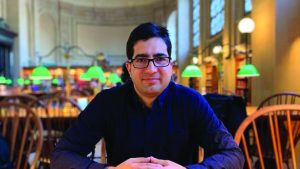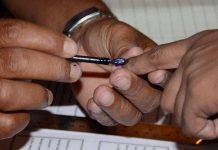Edited Excerpts from an interview •
I have been thinking about quitting for the past two years. This struggle has been going on within me. Harvard gave me an opportunity to detach myself and think about it.
I think bureaucrats do enjoy lot of power in the state because of the political instability. But the fact of the matter is that the power doesn’t belong to bureaucrats, power belongs elsewhere. Their power is derived from the exigency of the circumstances.
But you also say that bureaucrats wielding excessive power is part of the problem in J&K?
Yes that, in fact, is the part of the problem. When bureaucrats try to appropriate power from the politicians and they try to fill in a political space, that doesn’t auger well. We have seen a kind of depoliticization of the political space. By which I mean, people do not want to associate themselves with the politics and politics doesn’t provide any solutions.
But politicians also aren’t doing their job?
You have people who are dying. You have youngsters taking up gun against the state. There is open rebellion against the state. But this part of the problem is being addressed through a military operation. This is a political problem. You are telling the politicians this is not your job that you focus on repairing roads, culverts and laying of the electricity poles. There is a fundamental problem here: Military is dealing with political problem and the politicians have been restricted to addressing civic problems.
Governor Satya Pal Malik has urged you to return to your job?
It is not because of not getting good postings that I left the service. There were reasons which were completely exogenous. I see a huge political challenge and I wanted to contribute.
You have also said that the mainstream politicians do not represent the sentiment?
Yes. People who are in the electoral arena do not earn their mandate on the basis of the sentiment. They should be honest about it.
We are winning elections because just one percent of people vote for us and we feel we are not accountable to them. The day this mandate is real and people vote for us, that day we will assert ourselves. That this space belongs to us and we are not going to let it go.
They should not make loose statements about the realities they do not have mandate to do anything about. That space belongs to Hurriyat. We should respect their space.
Is this what you want to change?
Yes. Mainstream politicians have chosen to be daily wagers. Because they feel there is no other option. It’s a politics of convenience. You want to be in politics. You don’t have any ideology. You don’t have any motivation to change the system. I want to tell politicians that look, I had a huge career here and that I am giving it up to contribute and change the system.
But you say power lies somewhere else, not with the politicians in the state?
I don’t think power has been taken away. I think it has been given away. We want to take that power back. We are a very special state. We have a very unique legislative and legal status. We could have been very self-sufficient when it comes to maintaining things which we have. Problem is we have given away something. We have delegitimized the political space.
But this lack of power and accountability is less a failure of individuals and more the result of the structural nature of the conflict in the state. This has denied agency to the people and the politicians alike.
That is true. We don’t have agency. So somebody comes and takes a risk and tries to change the things. Finally, India and Pakistan have to recognize that Kashmiris are the primary stakeholders.
But isn’t problem in Kashmir too complex to be approached in literalist terms?
Every conflict zone is complex. Kashmir is not the only conflict zone. We have this misunderstanding that we face something or we are doing something which doesn’t happen anywhere else.We have seen leaders finding it difficult or getting discredited among their people elsewhere also.
But it is not that earlier the people have not tried to change the things. They have ended up getting discredited.
I completely agree with you. It is all about how much conscious you are to the lessons of the history. I am not a career politician as of now. And I am new to this field. And who has a little bit of understanding of the history and who is ready to make sacrifices. Somehow, I think I will be able to take lesson from the history.
You say Kashmiri lives matter. But you are now a part of the same political space which has presided over the killings of Kashmiris.
I am a part of the same political space but I am not the part of the same political parties. I think I have made it very clear that I will not be joining any of the mainstream political party.
Suppose you win an election tomorrow, you become a minister and people die under your watch. Would you resign?
I would. Why not. Not a big deal. At the same time, you have to understand who has the primary responsibility to address the political situation in the state. It is the central government. The state governments are interim administrations. They are there for governance. They are not there to resolve the conflict. They should not put on the facade and say that look we are here to solve the Kashmir issue. And then when killings happen and say we are powerless to stop them. They should stand for one of the two things.
But they can have a political position on the state as they claim to represent the people?
It is not that mainstream politics don’t have a representative character. They do stand for something. But I believe mainstream politicians never exerted. They have always agreed to work for the previous day’s wage. They don’t resign.
If this continues to happen, twenty years down the line you will see absolute decimation of the mainstream politics in the state.
How can you not become one of them?
My point is we have a political space. Let us not abandon it. Let us have good people who get elected. I am not somebody desperate to fight elections and get elected. I am ready to struggle in the field.
Would you like to be a part of the separatist politics which you say represents the sentiment of the people?
There is electoral politics and there’s separatist politics. I acknowledge and respect the separatist space and what they stand for. But I am not operating in that space. I am not here to provide solutions to something I can’t. We are saying we are going to operate in governance space and when it comes to politics we are going to tell the truth.
How do you perceive the politics of Omar Abdullah and Mehbooba Mufti?
I think it is very hard to do politics in a conflict zone. People do not judge you by your intentions. They judge you by your actions. And you have little control over your actions.
letters@tehelka.com













